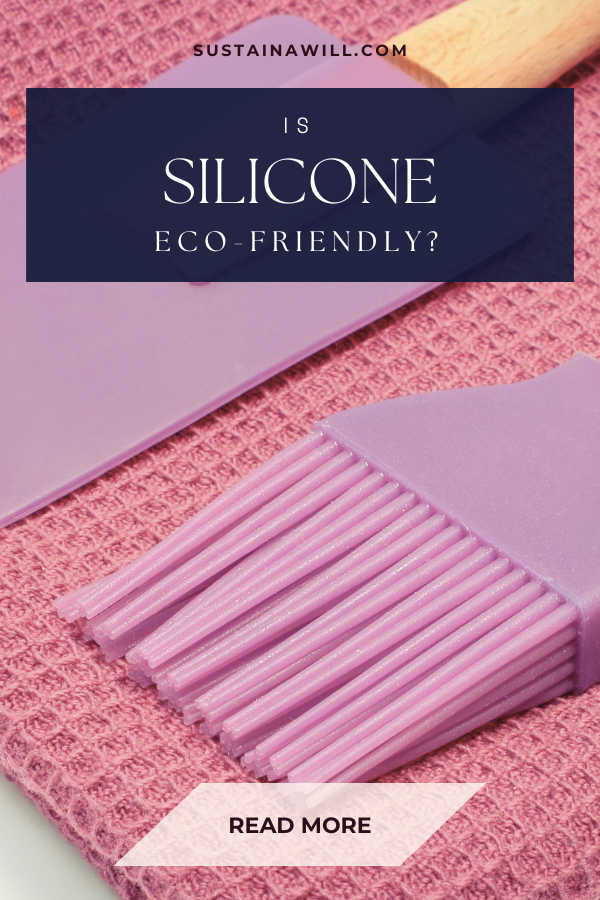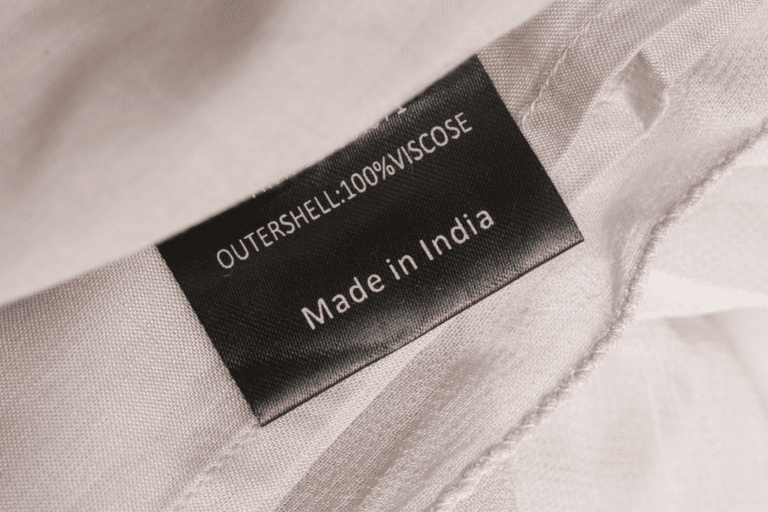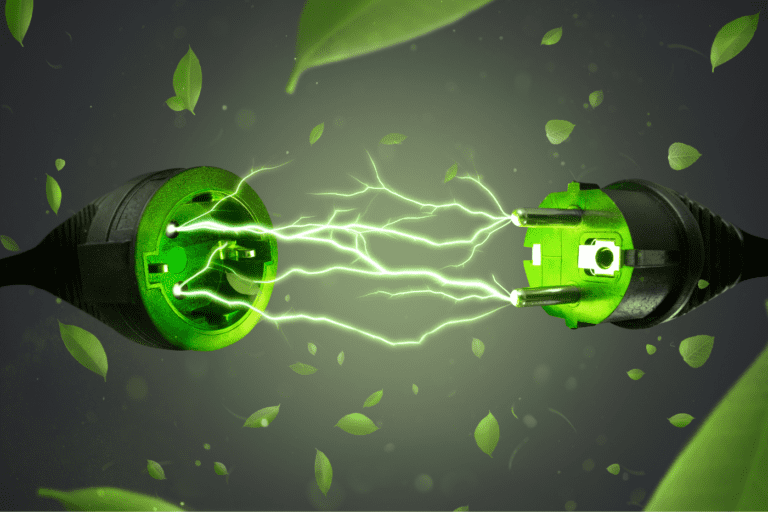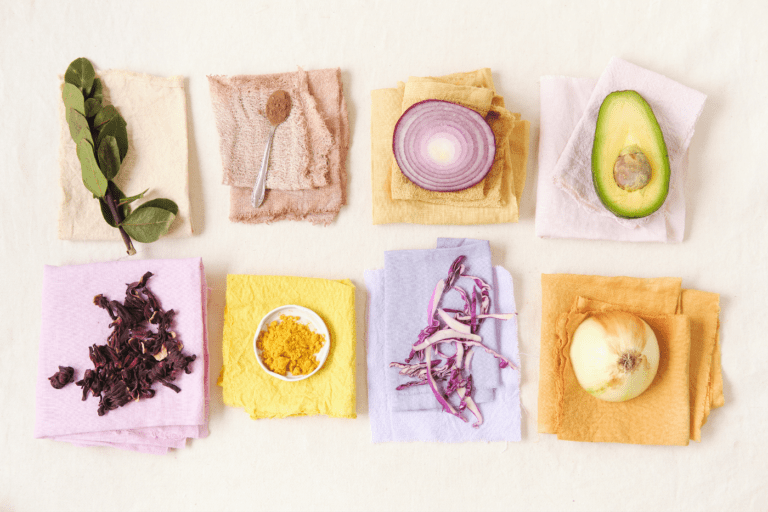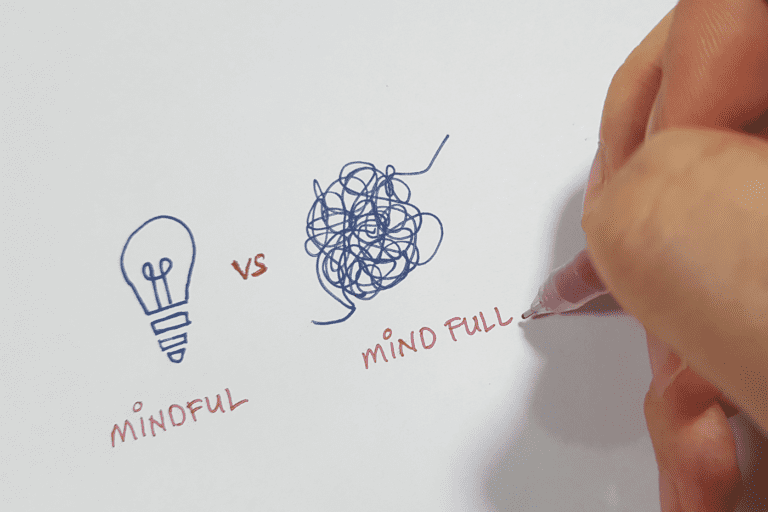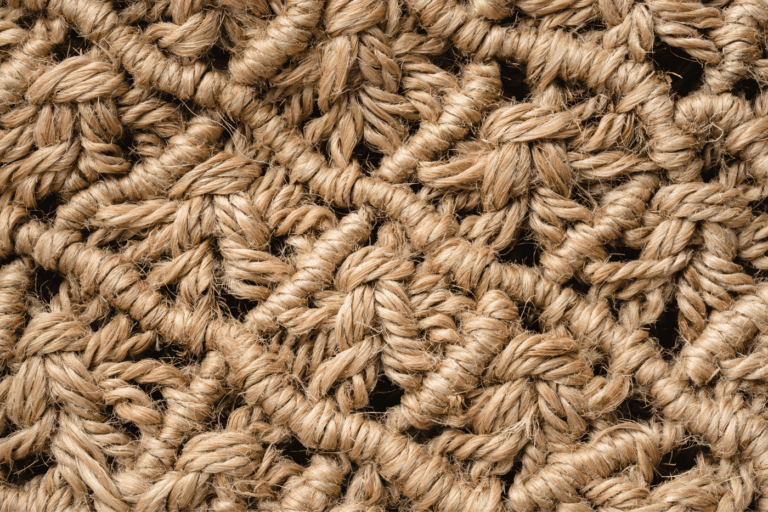Curious if silicone is eco-friendly or just a plastic imposter wearing a leafy disguise?
By the end of this exploration, you’ll be armed with the knowledge to make informed choices, whether you’re eyeing that silicone spatula, considering eco-friendly alternatives, or just satisfying your curiosity.
So, buckle up for the answers to your questions: Is Silicone Biodegradable or Eco-Friendly?
What is silicone?
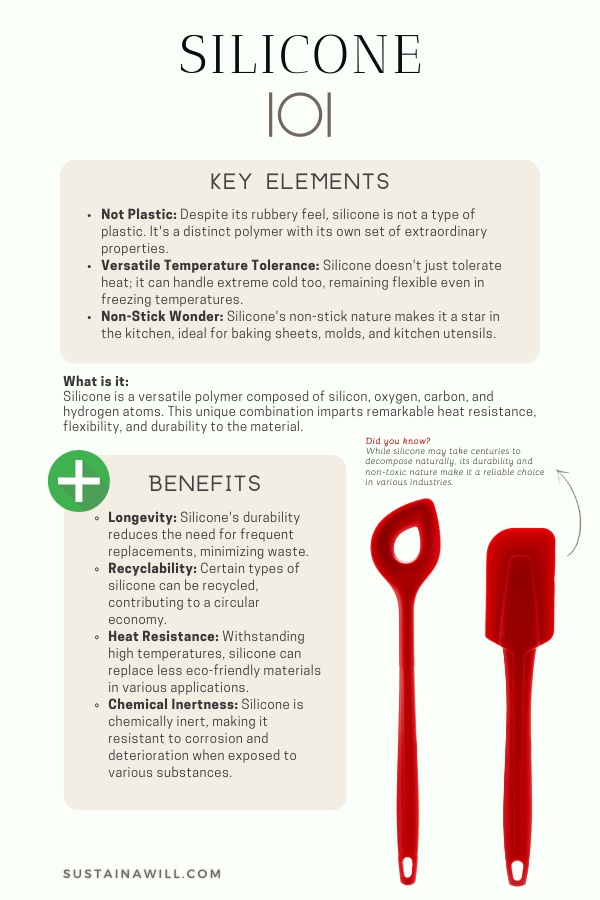
In a nutshell
Silicone is a synthetic material made from silicon (yup, they’re different!), oxygen, carbon, and hydrogen. It is known for its versatile properties, such as flexibility, heat resistance, and durability.
Now, where does silicone play a role in your life?
- Kitchen Utilities: From spatulas to baking molds, silicone contributes to kitchen tools’ flexibility and heat resistance.
- Automotive Components: Gaskets and seals benefit from silicone’s heat resistance and durability in the automotive sector.
- Technological Applications: In electronics and protective coatings, silicone’s insulating properties make it a go-to material.
Next time you encounter this adaptable material, remember – that’s silicone, a versatile companion in everyday products!
FYI: Silicon vs. Silicone
Silicon is a natural element found in the Earth’s crust, while silicone is a synthetic material created by combining silicon with oxygen, carbon, and hydrogen.
If you’re interested in the production process of silicone products check out this interesting YouTube video.
Is silicone biodegradable?
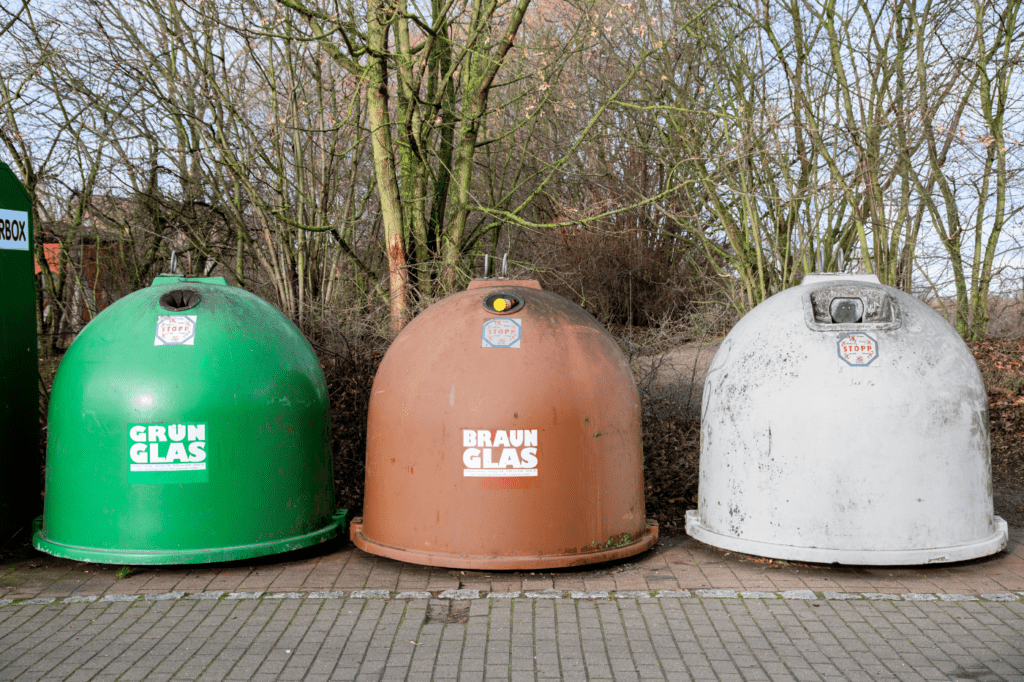
No, silicone is not biodegradable. Unlike some materials that break down naturally, silicone persists in the environment without undergoing the biodegradation process.
Can you decompose silicone?
Silicon’s robust molecular arrangement makes it a tough material to decompose.
We already talked about this material’s resistance against natural decomposition.
However, there are industrial processes to break down silicone, usually involving extreme heat or specialized chemicals.
But it’s worth noting that these methods are not eco-friendly, and not as nearly as widespread as plastic recycling.
How long does silicone take to decompose?
Silicone can take centuries to decompose naturally. Yes, you read that right!
Likewise, the industrial decomposition of silicone isn’t an overnight sensation. Depending on the scale of the process, it can take days to weeks for the silicone to transform into more manageable components.
Is silicone really environmentally friendly?

Yes, silicone can be considered environmentally friendly.
- Durability: Silicone is incredibly durable, outlasting many other materials. This means less frequent replacement and, in turn, reduced waste over time.
- Recyclability: Certain types of silicone can be recycled, contributing to a more sustainable life cycle. However, the availability of recycling facilities for silicone may vary.
- Low Toxicity: Silicone is generally considered non-toxic, which is a plus for both human health and the environment.
Is silicone safer than plastic?

Yes, silicone is generally safer than plastic. For a deeper dive into this topic check out our guide about silicone vs plastic.
- Chemical Composition: Silicone is made from silicon, oxygen, carbon, and hydrogen—elements that are less likely to leach harmful chemicals compared to some plastics.
- Heat Resistance: Silicone can withstand high temperatures without releasing harmful substances, making it a safe choice for kitchenware.
- No Phthalates or BPA: Unlike some plastics, silicone doesn’t contain phthalates or BPA, notorious for their potential health risks.
Here’s a list of plastic types that silicone is generally considered more environmentally friendly than:
- Single-Use Plastics: Items like disposable water bottles, straws, and plastic bags.
- PVC (Polyvinyl Chloride): Often used in pipes, cables, and construction materials.
- Polystyrene (Styrofoam): Found in disposable cups, food containers, and packaging materials.
- Certain Soft Plastics: Some flexible plastics that are used in packaging films and bags.
- Polycarbonate: Commonly used in some water bottles and food containers.
Does silicone give off Microplastics?
No, silicone does not give off microplastics.
- Microplastic-Free: Silicone doesn’t shed microplastics during use or breakdown. Microplastics, those tiny particles causing environmental concerns, are not a worry with silicone.
- Stable Structure: Silicone’s molecular structure is stable, meaning it doesn’t break down into minuscule particles like some plastics, keeping our oceans and ecosystems microplastic-free.
In a nutshell, silicone emerges as a durable, safe, and microplastic-free option, making it a sustainable choice compared to certain plastics.
What are even more eco-friendly alternatives to silicone?
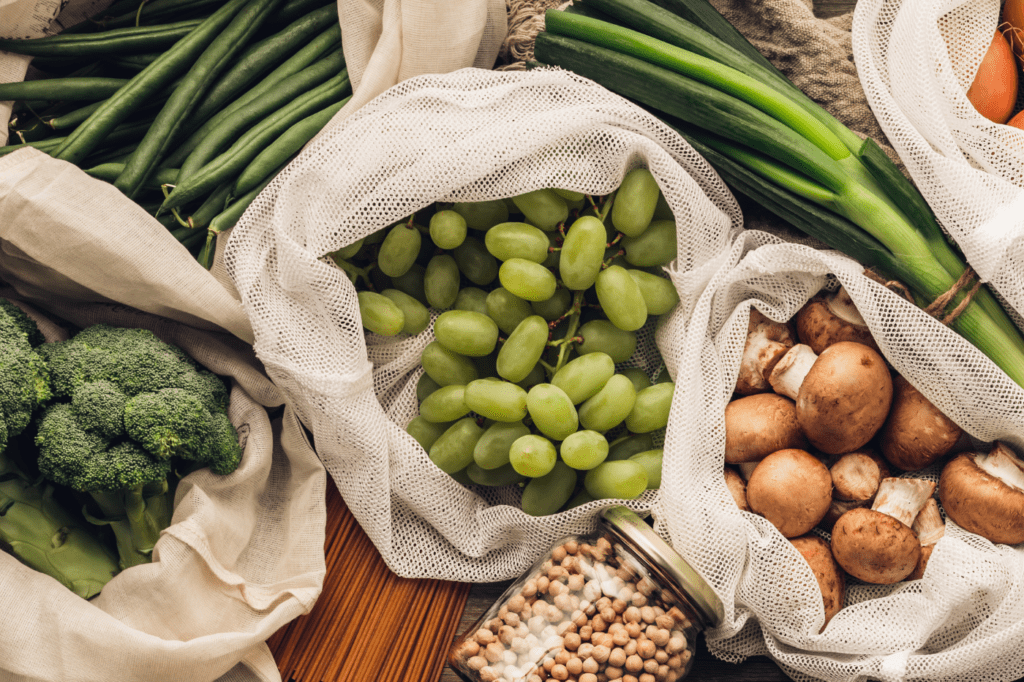
If you’re looking to explore even more eco-friendly alternatives to silicone, there are several options worth considering.
Here’s a list of environmentally conscious materials:
- Glass:
- Pros: Fully recyclable, non-toxic, and doesn’t leach harmful substances.
- Uses: Food storage containers, drinkware, and kitchenware.
- Stainless Steel:
- Pros: Durable, recyclable, and resistant to corrosion.
- Uses: Water bottles, containers, and kitchen utensils.
- Bamboo:
- Pros: Rapidly renewable, biodegradable, and lightweight.
- Uses: Utensils, cutting boards, and even some packaging.
- Beeswax Wraps:
- Pros: Reusable and biodegradable alternative to plastic wrap.
- Uses: Food storage wraps.
- Recycled Cotton:
- Pros: Natural and biodegradable.
- Uses: Reusable bags, towels, and produce bags.
- Cornstarch-Based Plastics (Bioplastics):
- Pros: Derived from renewable resources, biodegradable.
- Uses: Packaging materials, disposable cutlery, and tableware.
- Hemp:
- Pros: Fast-growing, requires minimal pesticides, and biodegradable.
- Uses: Fabrics, bags, and accessories.
- Wood:
- Pros: Renewable and biodegradable.
- Uses: Utensils, cutting boards, and kitchen tools.
- Recycled Plastic:
- Pros: Using recycled plastics helps reduce the demand for new production.
- Uses: Various products, from containers to clothing.
Curious about the eco-credentials of the products you’re eyeing? Dive into the world of sustainability certifications with our must-read guide here.
Conclusion
Remember
- Silicone may not be the speediest decomposer, but its durability can reduce long-term waste.
- While silicone is considered fairly eco-friendly, there’s a whole bunch of alternatives, like glass, stainless steel, and bamboo, waiting for your eco-conscious embrace.
Small changes collectively make waves!
